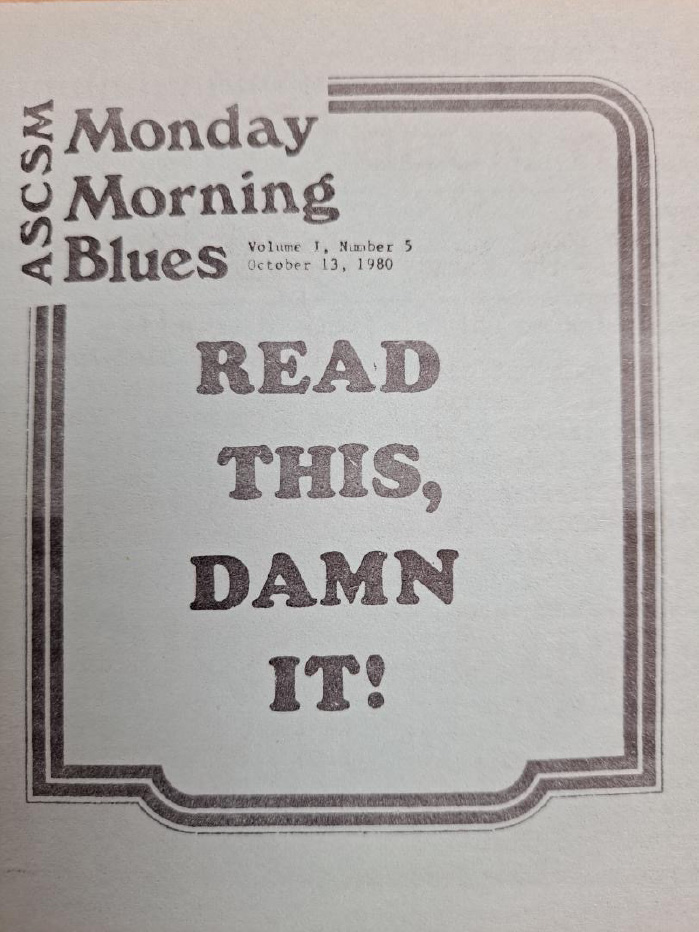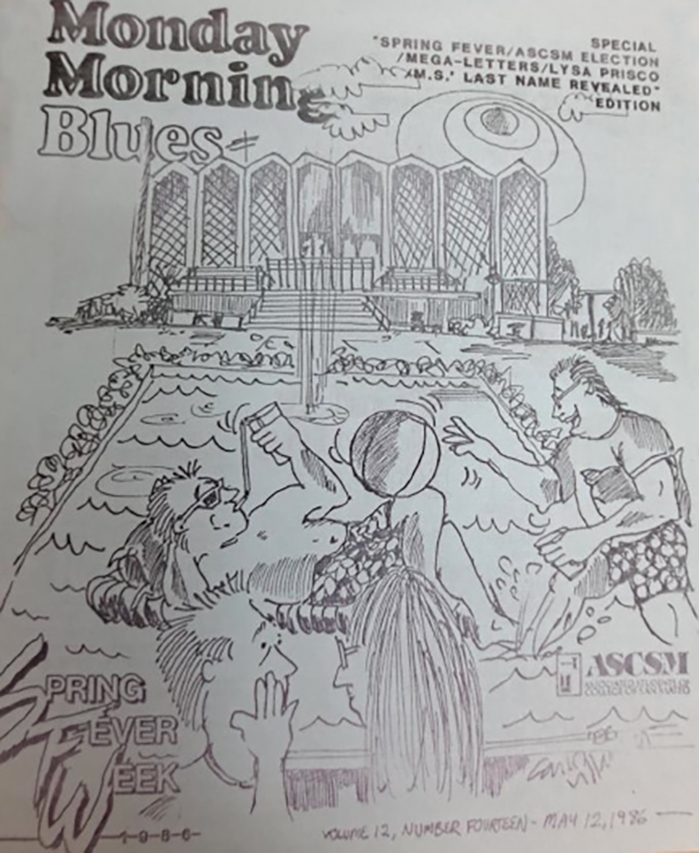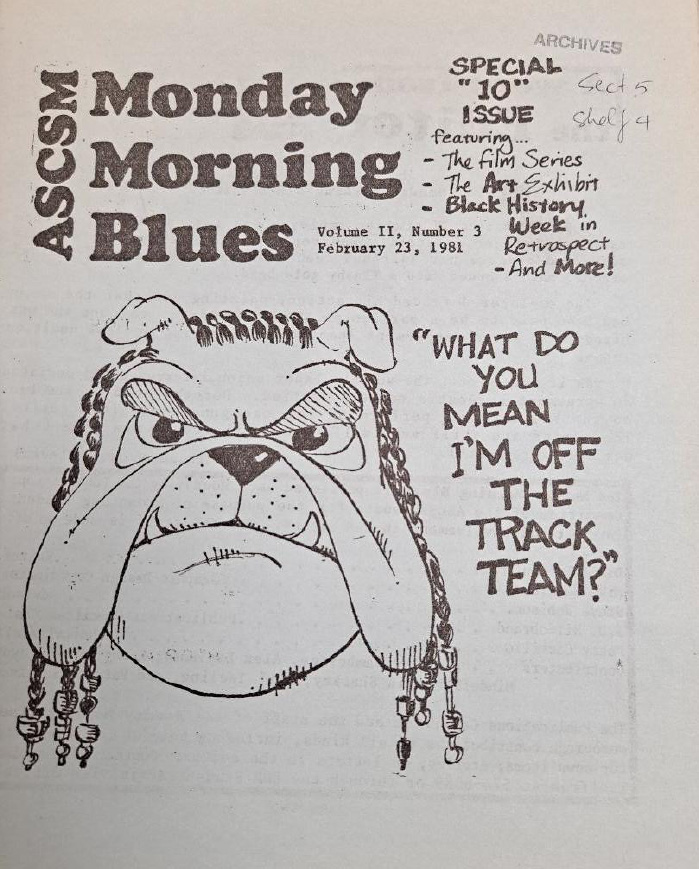Monday Morning Blues
Salty student-founded weekly kept CSM on edge for 25 years
The 1980s continued a revolution in nonfiction writing, with reporters like Joan Didion, Hunter S. Thompson, and Tom Wolfe smashing the idea of the “impartial” observer in favor of a creatively presented and perhaps higher truth.
College of San Mateo had its own version of this New Journalism in the Monday Morning Blues, an irreverent, contentious weekly that roiled the campus for roughly 25 years. Printed on pale blue 7.5 x 14 sheets hand-folded to resemble college exam books, the Monday Morning Blues was funded by the Associated Students of CSM to report on ASCSM activities but in fact displayed the freewheeling thoughts of its staff. They called their product “abstract journalism.”
The Blues was founded by J.D. Hildebrand, a communications major who aimed to disrupt what he saw as complacency on campus.
A typical article, 1985’s “Club San Mateo,” described the campus as “an association that does not tolerate liberals, poverty, protests, seriousness, anything political or thought-provoking ideas. ... I’m sure you would agree. Our motto is Beautiful, Moral and Wealthy.”
Replied student Meredith Folsom: “I really am poor, no fooling. ... Your article ‘Club San Mateo’ was it. I wanted to roll in it. You mean someone else noticed?”
Hildebrand and staff handed issues out personally to the CSM community as people arrived after the weekend. Lines formed to get the latest gossip, humor and thoughts on campus life, politics and culture. The raggedly printed issues took on the value of scarcity.
The ASCSM and the Blues had frequent arguments, given that the Blues often fulfilled its brief to report on student government with one-line stories like, “Nothing of note happened at Student Senate today.”
Instead, J.D. hurled the F-bomb in one of the very first issues, reporting vandalism of the Gay Student Union’s application to form a student club by repeating the words the vandal had written. The Blues condemned the vandalism and urged readers to attend GSU meetings and become gay allies.
Many Blues staffers were interns at KABC, KCBS or other San Francisco stations, well positioned to contribute news on happenings there.
February 13, 1981’s “What do you mean, I’m off the track team?” examined KGO-TV newswoman Dorothy Reed’s suspension for wearing cornrows on the air. (In what KGO called a “compromise,” Reed was finally allowed to wear braids but not shiny gold beads.)
The Blues thematically linked this episode to “roots” initiatives at CSM and pressure on Bulldog athletes to be clean-cut. It praised student Sen. David King’s Roots Awareness Club as “an integral component of CSM’s large minority population whose goal is to send at least one member to Africa to trace their heritage.”
Copy editing was never the Blues’ strong point, so, in November 1985, the Blues held its first contest for CSM faculty: “The instructor who finds the most valid spelling errors in the Blues will win an all-expenses-paid dinner for two at Swiss Louie’s on Pier 39 in SF, plus a karaoke recording and a 30-minute horse and buggy ride.”
It was judged by CSM English instructor Richard Williamson, who earned this honor by responding to the Blues’ “What Makes You Mad As Hell” feature with “People who spell the word ‘rebuttal’ with ‘-le’ at the end.”
CSM biology professor Michael Bucher won the contest, finding 31 errors. Water polo coach Richard Donner was second with 30.



Covers from 1980s issues of student-produced Monday Morning Blues. CSM Library
Writer Lysa Prisco examined the CSM disability community’s longstanding problems of access by attending class in a wheelchair.
When one disabled student confronted her as a disability tourist, Prisco urged him to become a Blues contributor.
This was in line with the Blues’ motto “All the news that fits, we print.” For years, the Blues published pretty much anything it received in order to showcase diverse views on campus.
Sometimes, though, the Blues got it horribly wrong.
In September 1989, the Blues printed an essay signed by one “Jubal Early” that detailed the author’s dislike of Asian-Americans after being dumped by an Asian girlfriend. It was titled, “Who Do You Hate?”
The uproar made national news. Four hundred people, including CSM President Lois Callahan, attended a CSM antiracism workshop convened by longtime ethnic studies professor Zelte Crawford and others after the scandal. The Blues was told to limit future contributors to CSM affiliates using their real names (Jubal Early, in what should have been a tip-off, was a Confederate general). For weeks, these contributions consisted almost entirely of responses by Asian students. Crawford renewed calls for an ethnic studies graduation requirement to help broaden community understanding, a proposal still being discussed today.
The Blues continued into the 21st century, still irreverent but increasingly diverse as CSM’s demographics broadened. Its decline, some say, stemmed not from its content but from a rule to reduce waste by banning people from handing out paper on campus. When the Blues was left in newsracks, this thinking goes, it became less covetable. The last issue archived in the CSM Library dates from 2004.
J.D. Hildebrand went on to success as a magazine editor specializing in tech journalism. He moved to Belgrade and became a foreign correspondent and blogger.
“The Blues was a special project, not just for me, but for a group of committed idealists who have remained friends for the past 40-plus years,” Hildebrand says. “I think it was something special. And it was a launching point for my career in journalism, which continues to pay my bills.”

